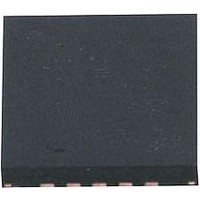LTC4160EUDC#PBF Linear Technology, LTC4160EUDC#PBF Datasheet - Page 21

LTC4160EUDC#PBF
Manufacturer Part Number
LTC4160EUDC#PBF
Description
IC, BATT CHRG, Li-Ion, Li-Polymer, 1.2A, QFN20
Manufacturer
Linear Technology
Datasheet
1.LTC4160EPDCPBF.pdf
(32 pages)
Specifications of LTC4160EUDC#PBF
Battery Type
Li-Ion, Li-Polymer
Input Voltage
5.5V
Battery Charge Voltage
4.2V
Charge Current Max
1.2A
Battery Ic Case Style
QFN
No. Of Pins
20
No. Of Series Cells
1
Rohs Compliant
Yes
Lead Free Status / RoHS Status
Lead free / RoHS Compliant
Available stocks
Company
Part Number
Manufacturer
Quantity
Price
APPLICATIONS INFORMATION
Bidirectional PowerPath Switching Regulator CLPROG
Resistor and Capacitor Selection
As described in the Bidirectional PowerPath Switching
Regulator – Step-Down Mode section, the resistor on the
CLPROG pin determines the average V
limit. In step-down mode the switching regulator’s V
input current limit can be set to either the 1x mode (USB
100mA), the 5x mode (USB 500mA) or the 10x mode. The
V
the current that is used to drive V
current of the switching regulator. To ensure that the total
average input current remains below the USB specification,
both components of input current should be considered.
The Electrical Characteristics table gives the typical values
for quiescent currents in all settings as well as current limit
programming accuracy. To get as close to the 500mA or
100mA specifications as possible, a precision resistor
should be used. Recall that:
An averaging capacitor is required in parallel with the
resistor so that the switching regulator can determine the
average input current. This capacitor also provides the
dominant pole for the feedback loop when current limit
is reached. To ensure stability, the capacitor on CLPROG
should be 0.1µF or larger.
Bidirectional PowerPath Switching Regulator Inductor
Selection
Because the V
of the PowerPath switching regulator are both fairly nar-
row, the LTC4160/LTC4160-1 were designed for a specific
inductance value of 3.3μH. Some inductors which may be
suitable for this application are listed in Table 3.
Table 3. Recommended PowerPath Inductors for the
LTC4160/LTC4160-1
INDUCTOR
TYPE
LPS4018
D53LC
DB318C
WE-TPC
Type M1
CDRH6D12
CDRH6D38
BUS
I
VBUS
input current will be comprised of two components,
= I
(μH)
3.3
3.3
3.3
3.3
3.3
3.3
L
VBUSQ
MAX IDC
BUS
2.26
1.55
1.95
(A)
2.2
2.2
3.5
+ V
voltage range and V
CLPROG
MAX DCR
0.034
0.070
0.065
0.063
0.020
0.08
(Ω)
/R
3.9 x 3.9 x 1.7 Coilcraft
3.8 x 3.8 x 1.8
4.8 x 4.8 x 1.8 Wurth Electronik
6.7 x 6.7 x 1.5
CLPPROG
SIZE IN mm
(L x W x H) MANUFACTURER
5 x 5 x 3
7 x 7 x 4
OUT
and the quiescent
OUT
BUS
• (h
www.coilcraft.com
Toko
www.toko.com
www.we-online.com
Sumida
www.sumida.com
CLPROG
voltage range
input current
+1).
BUS
Bidirectional PowerPath Switching Regulator V
and V
The type and value of capacitors used with the LTC4160/
LTC4160-1 determine several important parameters such
as regulator control-loop stability and input voltage ripple.
Because the LTC4160/LTC4160-1 use a bidirectional
switching regulator between V
current waveform contains high frequency components.
It is strongly recommended that a low equivalent series
resistance (ESR) multilayer ceramic capacitor (MLCC) be
used to bypass V
are not recommended because of their high ESR. The value
of the capacitor on V
input ripple for a given load current. Increasing the size
of this capacitor will reduce the input ripple.
The inrush current limit specification for USB devices is
calculated in terms of the total number of Coulombs needed
to charge the V
inrush charge for USB On-The-Go devices is 33μC. This
places a limit of 6.5μF of capacitance on V
a linear capacitor. However, most ceramic capacitors have
a capacitance that varies with bias voltage. The average
capacitance needs to be less than 6.5μF over a 0V to 5V bias
voltage range to meet the inrush current-limit specification.
A 10μF capacitor in a 0805 package, such as the Murata
GRM21BR71A106KE51L would be a suitable V
capacitor. If more capacitance is required for better noise
performance and stability, it should be connected directly
to the V
circuit. This extra capacitance will be soft-connected over
a couple of milliseconds to limit inrush current and avoid
excessive transient voltage drops on V
To prevent large V
conditions, it is also recommended that an MLCC be used
to bypass V
pensation of the switching regulator. At least 10µF with
low ESR are required on V
improve load transient performance and stability.
MLCCs typically have exceptional ESR performance.
MLCCs combined with a tight board layout and an unbroken
ground plane will yield very good performance and low
EMI emissions.
OUT
BUS
Bypass Capacitor Selection
OUT
pin when using the overvoltage protection
BUS
. The output capacitor is used in the com-
LTC4160/LTC4160-1
BUS
OUT
bypass capacitor to 5V. The maximum
. Tantalum and aluminum capacitors
BUS
voltage steps during transient load
directly controls the amount of
OUT
. Additional capacitance will
BUS
and V
BUS
OUT
.
BUS
BUS
, the V
assuming
BUS
21
bypass
41601fa
BUS













